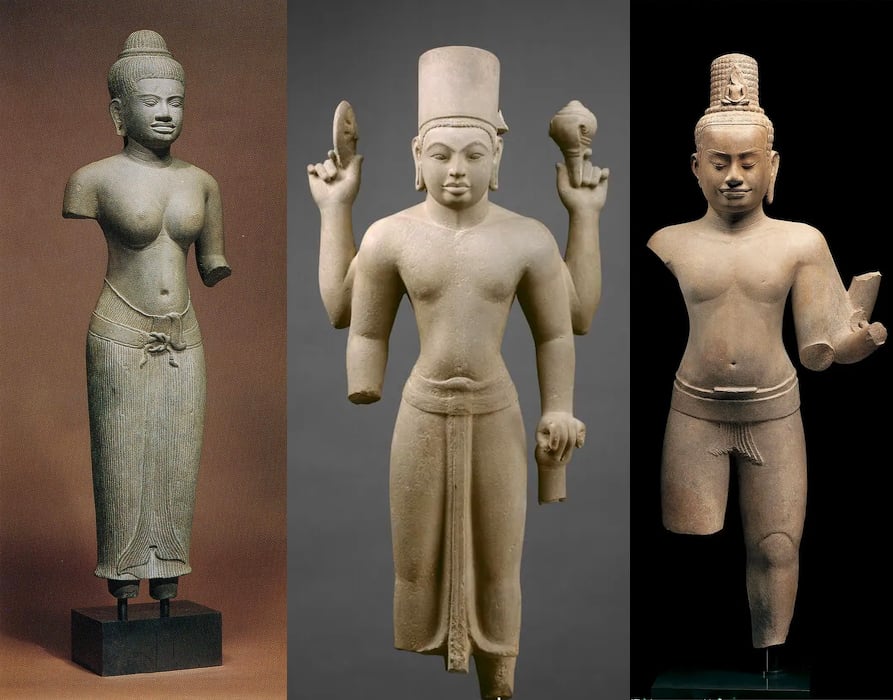
Officials in Cambodia believe that New York’s Metropolitan Museum of Art possesses no fewer than 33 artifacts looted by a single smuggler.
A reformed looter named Toek Tik told authorities that he personally stole the 33 works out of Cambodia during a 20-year run as a smuggler. Before he died of the coronavirus last November at age 62, he tried to help government officials track down stolen Khmer artifacts he had helped smuggle abroad.
According to Toek Tik, many of those works passed through the hands of the late Douglas Latchford, a once-respected Southeast Asian antiquities dealer who has since been identified as a large-scale smuggler responsible for placing looted art from the region in Western museums.
The story was first reported by the New York Times.
The depths of Latchford’s smuggling operation are only now coming to light, thanks in large part to investigations into the Pandora Papers, a massive leak of offshore financial transactions by the Washington Post and the International Consortium of Investigative Journalists (ICIJ).
Cambodian officials found this photo of antiquities dealer Douglas Latchford, left, and Metropolitan Museum of Art curator Martin Lerner on Latchford’s computer. Photo courtesy of the Cambodian Government.
Latchford, who styled himself a scholar of Southeast Asian antiquities, published numerous books on the subject and forged strong relationships with leading curators in the field, including Martin Lerner, who spearheaded the Met’s Southeast Asian collecting efforts during his 31-year tenure at the museum.
Following his departure from the Met, Lerner worked as a consultant for the dealer.
Authorities first became suspicious of Latchford’s dealings in 2012, when a pair of looted statues he acquired came up for sale at Sotheby’s New York. The U.S. government charged Latchford with trafficking in looted antiquities in November 2019. (He died the following August, at age 88, and his daughter restituted his collection.)
“Knowing what I know now, I should probably not have worked so closely with Mr. Latchford,” Lerner told the Times.
The Met acquired at least 13 artifacts from Latchford, either by donation or purchase, starting in 1983. But in October, Cambodia launched an investigation into the origins of 45 works at the museum.
Toek Tik, who was ill with pancreatic cancer before his death, claimed to remember removing those antiquities from sites across the Cambodian jungle. Conscripted by the Khmer Rouge as a teenager and forced to participate in killing squads, he fell into a life of antiquities smuggling after fleeing the militant group in 1977. Hiding in the jungle, he quickly realized he could trade forgotten artifacts for money.
Cambodia’s Koh Ker. Photo by Patrick Aventurier/Gamma-Rapho via Getty Images.
For the next 20 years, Toek Tik made his living selling freshly excavated statuary, overseeing multiple crews as they took advantage of Cambodia’s political instability to pillage historic sites.
In some instances, Toek Tik’s accounts are supported by interviews with others who participated in the smuggling ring, on-the-ground evidence at historic sites, and Latchford’s papers. In other cases, the details are blurrier: Toek Tik remembered several similar artifacts that all resemble a given piece at the Met, for instance.
“The Met is closely following these recent developments, and we are in active dialogue with Cambodia,” a museum spokesperson told Artnet News. “We have shared our provenance with Cambodia’s representative; and we have requested that Cambodia share any new, relevant information it has recently obtained.”
The Denver Art Museum agreed to restitute four Latchford-linked Cambodian antiquities last October, based in part on Toek Tik’s evidence. Netscape creator James H. Clark similarly turned over 35 Southeast Asian antiquities he bought from the dealer to the U.S. Department of Homeland Security in January.
Cambodia hopes the U.S. Justice Department will assist in its mission to reclaim further objects from the Met collection. The museum repatriated a pair of looted Koh Ker temple complex “Kneeling Attendants” to Cambodia in 2013 that had been partially gifted by Latchford.